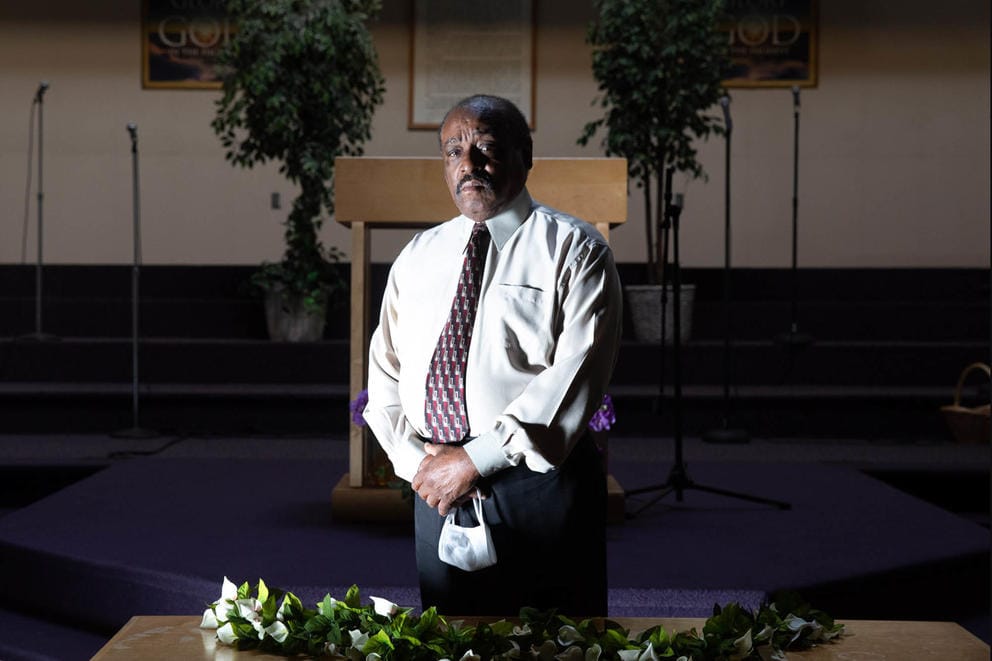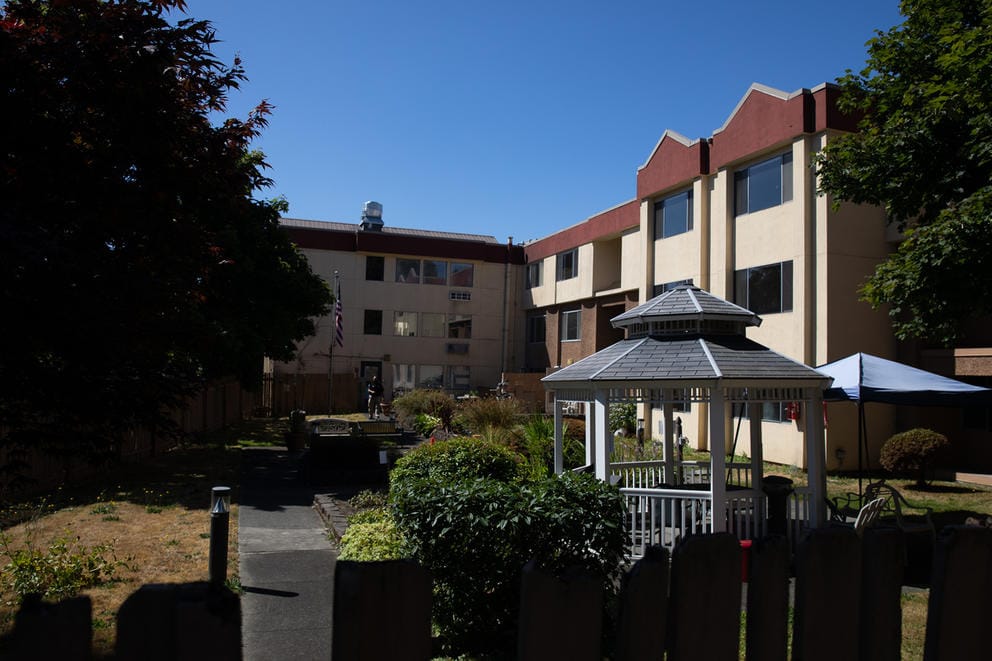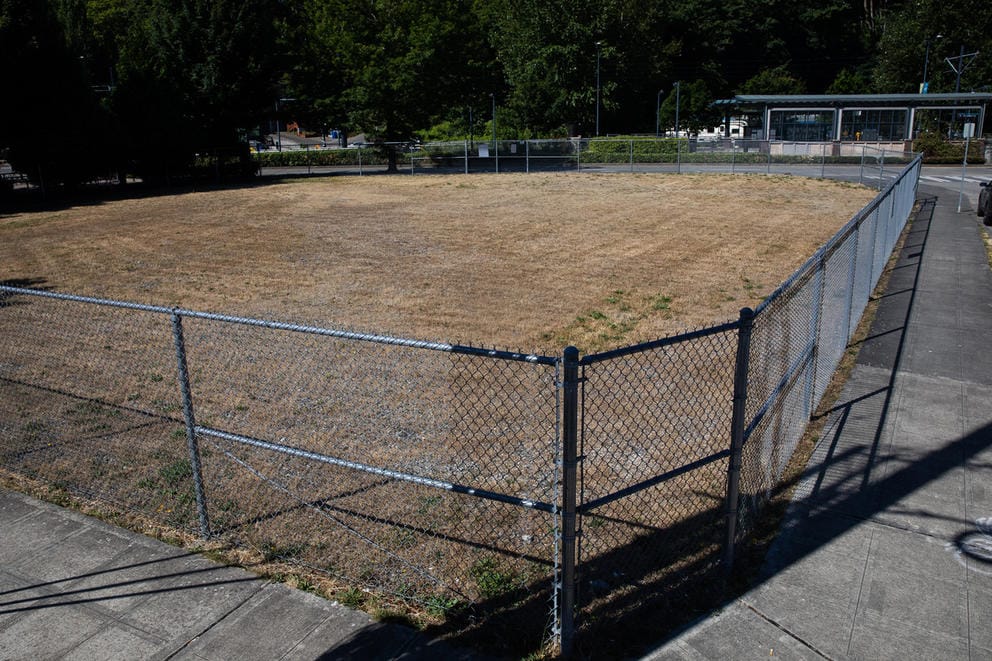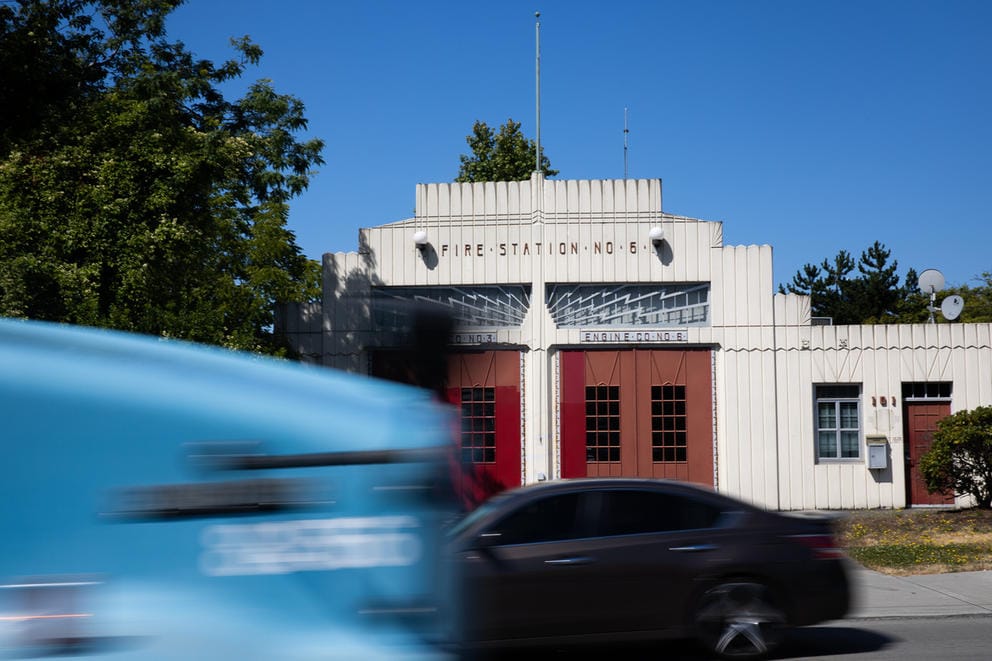In the midst of ongoing protests against police brutality and the death of George Floyd, Black communities in the Seattle area have begun a push for bigger, more long-term actions toward overcoming the poverty created by decades of racist policies.
“We need reparations for our Black and brown communities,” said Pastor Angela Ying of Bethany United Church of Christ one sunny morning in June in front of New Hope Missionary Baptist Church in the historically Black Central District neighborhood. “Isn’t it bad enough that the land was stolen from the Duwamish people?”
Ying then drew a clear line, connecting the death of Floyd to the lack of land and housing in the Seattle region, particularly for Black individuals.
“Get your knee off our necks and build houses for us,” Ying said. She was referring to the way Floyd died in police custody and her demand that a big business tax fund the building of hundreds of homes in the neighborhood, some of it on church property and other land people living in the Central District were forced to relinquish years ago.
One by one, pastors walked up to the podium and reminded those gathered there of the Central District’s golden days, when more than 70% of the population was Black before it dwindled to the approximately 15% it is today.
“We believe a systematic genocide took place in Seattle’s Central neighborhood,” said Hayward Evans of the Washington State Civil Rights Coalition as he referred to years of displacement and the continued lack of affordable housing for Black families. “As Martin Luther King said, it’s never too late to do the right thing.”
To many, the Black Lives Matter movement has always been about much more than an uprising against police brutality. The health and economic inequities emphasized by the current COVID-19 crisis has firmed that resolve. Black communities nationwide have been disproportionately impacted by the virus while at the same time earning less. In 2018, the median income for a household headed by a Black person in Seattle was $42,500, compared with $105,100 for one headed by a white person, according to the U.S. Census Bureau.
Overall, the Black population in Seattle is at its lowest point in 50 years, though it has increased in the rest of King County, where the cost of living can be lower. Activists see access to land as one way to build the wealth denied to them by systemic racism and to begin to even the playing field.
“I call it reparations, because if it's not reparations, it becomes sort of charitable, you know, and it's not a charitable offer. It's a payment for a debt,” said Donald King, a professor of architecture at the University of Washington who has lived in the Central District for approximately 40 years and is part of The Nehemiah Initiative, a church-led, community-based partnership designed to preserve and revitalize the Central District.
“So people say, well, why are you doing this? This is racist,” King said, referring to activists’ demand for land. “You're not doing it for white people. But white people didn't have to suffer under the unconstitutional actions that were taken with redlining and other things.” The practice of redlining after the Great Depression encouraged banks to loan money to would-be home buyers in mostly white neighborhoods.
“I think it is important that the Black Lives Matter movement is tying those historic wrongs to what's happening right now, which is a deeply economically and racially unequal society under capitalism,” Seattle City Councilmember Kshama Sawant, a longtime supporter of a business tax, said in a recent interview.

Rev. Dr. Robert Jeffrey, Sr. stands at the altar of New Hope Missionary Baptist Church in Seattle, July 28, 2020. (Matt M. McKnight/Crosscut)
Pastors and advocates hold up New Hope Missionary Baptist Church and the land taken from it as a startling example of the barriers Black communities have faced throughout decades of systemic racism.
Starting in the 1960s, the U.S. Department of Housing and Urban Development, or HUD, created what’s known as the Model Cities Program. The aim of the program was to clear out “blighted” areas in inner cities by creating opportunities for urban development. Under that program, which targeted the Central District locally, New Hope Missionary Baptist Church was forced to sell land now part of Spruce Street Mini Park to Seattle for $34,000. That land, which New Hope owned until 1970, is now worth $2 million, according to the Low Income Housing Institute.
“The land was unjustly taken,” said Pastor Robert Jeffrey in a recent interview. “We have evidence that the pastor, the church, did not want to sell the land, but he was threatened that if he didn't sell, they would take it for less money than they were offering. So he relented.”
Jeffrey said he and others are looking at other parcels of land in the Central District taken from the Black community. But for now, he wants part of the $18 million slotted for housing for residents with community connections, and generated by Seattle’s new annual tax on big business, to go to his church to build 90 units of affordable housing. The new business tax is expected to raise a total of more than $200 million annually.
The community goal overall is for at least 1,000 new affordable apartments to be built over three years for historic residents and those displaced from the Central Area. In a letter to Mayor Jenny Durkan and the Seattle City Council, Jeffrey and two other pastors also said they want to train students of color to help construct some of the new neighborhood developments, including tiny houses.
Sawant said she has helped champion the pastors’ goals in an attempt to prevent deepening poverty, citing the likelihood of a pandemic-related recession hurting Seattle.
“The only way that we can prevent this, the burden of this recession from landing on the shoulders of working class people in general, but most acutely on working class communities of color, is to do the exact opposite, which is invest in the community,” she said, adding that would include both new housing and construction jobs for the community.
Jeffrey said he also supports the land-based demands from King County Equity Now, a community-led group spearheading the call for defunding the police in Seattle. King County Equity Now wants to stop the redevelopment of Yesler Terrace, a public housing complex in the Central District that is a mix of deeply subsidized and market-rate homes. The project is nearly complete.
“In order to consider the legitimacy of a demand, you have to look at what was promised,” Jeffrey argued, referring to the Seattle Housing Authority, which has helped oversee the project. “They underdelivered on the promise of bringing African Americans back into the community, and they underdelivered on the promise of including African Americans in the development process.”
Kerry Coughlin, director of communications with the Seattle Housing Authority, said former Mayor Norm Rice, a longstanding African American community leader, and Black-led groups such as Africatown were intimately involved in the redevelopment of the property. Coughlin added that the redevelopment has created a greater number of affordable housing units, a large percentage of which are serving Black individuals and people of color.
Coughlin said she also wants to ensure some of King County Equity Now’s proposals don’t have the unintended consequences of leading to a loss of affordable housing. Another demand from King County Equity Now — to build affordable housing on the Seattle Housing Authority’s operations site — would mean her organization would have nowhere from which to maintain 60% of its affordable housing units. Not all of King County Equity Now’s demands involve affordable housing. The group is also asking that a Central Area nursing home — Paramount — which the Washington state Department of Social and Health Services acquired due to bankruptcy, be reverted back to Black-community ownership. To free up hospital beds during the pandemic, the state bought the nursing home this year for $13.5 million.

Paramount Nursing Home in Seattle's Central District, July 28, 2020. Acquired by the state of Washington, King County Equity Now wants it to be reverted to Black-community ownership. (Matt M. McKnight/Crosscut)

A vacant lot owned by Sound Transit near a light rail station in Seattle's Columbia City neighborhood, July 28, 2020. King County Equity Now has proposed this site become a youth achievement center. (Matt M. McKnight/Crosscut)
The group is also pushing for the building of a Youth Achievement Center at a vacant Sound Transit lot in Columbia City. With King County Executive Dow Constantine announcing the planned shutdown of the new youth jail, King County Councilmember Girmay Zahilay, who is helping shepherd the achievement center, said the plan for the center couldn’t come at a more opportune time.
The center is part of a broader national and local movement to reimagine criminal legal systems, Zahilay said in a recent interview.
“If you're closing down our traditional systems of youth incarceration, we need alternatives that are based on a housing-first approach that are therapeutic, that are based on community organizations that already have relationships and a track record with the youth that we're talking about,” he said. Programs such as Community Passageways and Creative Justice, an arts-based alternative to incarceration, will likely be part of the new center.
Zahilay said he also supports the Black Lives Matter movement’s overall push for land.
“Ownership is one of the best ways of preventing displacement. So if our communities are able to own property, they can dictate their own destiny,” Zahilay said.

A decommissioned Fire Station 6 at 23rd & Yesler in Seattle's Central District neighborhood, July 28, 2020. King County Equity Now has proposed that it become the William Grose Center for Cultural Innovation, per the City of Seattle's Equitable Development Plan. (Matt M. McKnight/Crosscut)
Another recent Central District win: the William Grose Center for Cultural Innovation, a meeting place designed to develop small businesses and Black entrepreneurs.
That center is to be built at Fire Station 6, which the city had promised in 2016 to redevelop as part of the Equitable Development Implementation Plan — a vision for growth that called for the distribution of publicly owned properties to communities facing displacement. The city finally made good on that promise in the midst of the anti-racism protests.
“For me, it's relatively simple,” said Isaac Joy of King County Equity Now. “The entire wealth of this country really was built on the Black backs of the enslaved.”
Moving the Black community past institutional racism and toward equity is the goal, with a timeline that doesn't last into the next century, Joy said.
A caption for a photograph of a vacant lot in Columbia City has been corrected. The lot is owned by Sound Transit.



